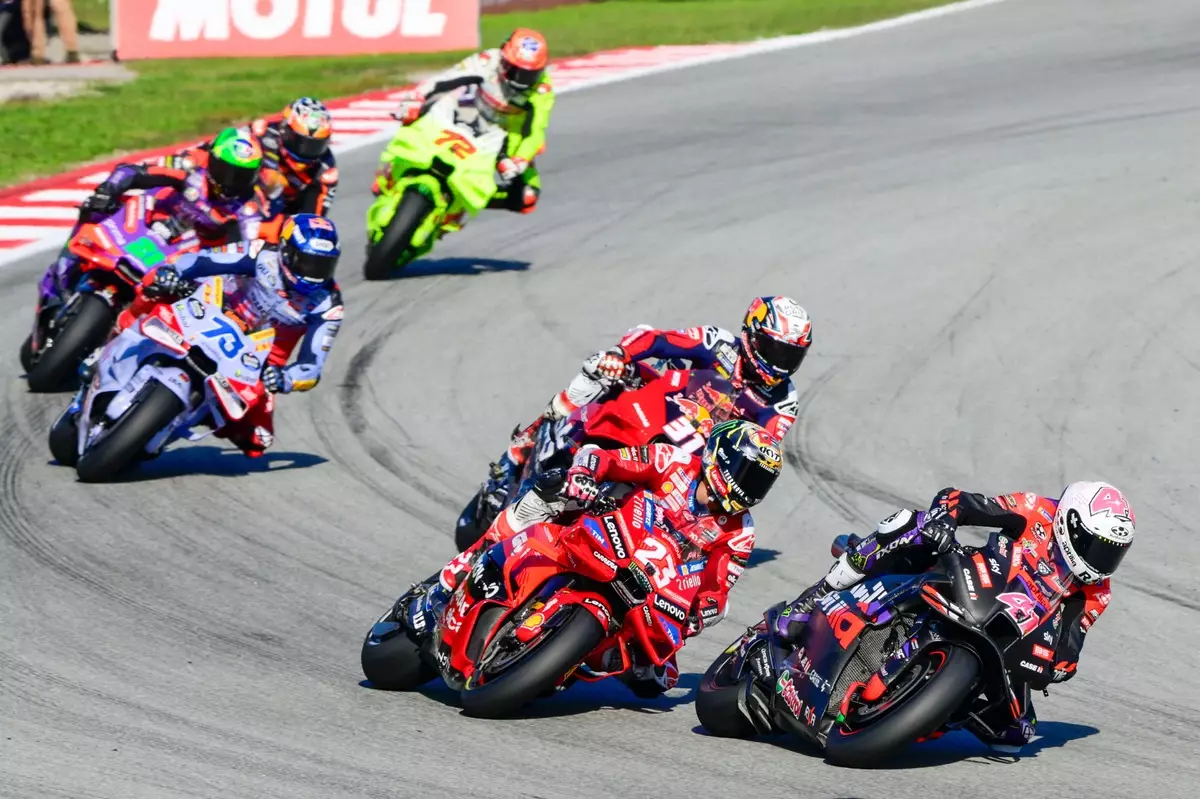Behind the Paddock: Analyzing the Controversy of Espargaro’s Tactical Defense in Barcelona
Hey there, fellow MotoGP enthusiasts! If you tuned into the recent Barcelona Grand Prix, you probably felt the adrenaline pumping as the riders roared around the track. While Francesco Bagnaia clinched a well-deserved victory and Jorge Martin pushed forward in his championship quest, another subplot quietly simmered under the surface. This was the clash between Ducati’s Enea Bastianini and Aprilia’s Aleix Espargaro—a narrative rich with themes of friendship, sportsmanship, and competitive integrity.
This particular race stirred a lot of emotions for me. As someone who loves both the strategy and raw speed of MotoGP racing, seeing personal relationships mix with professional rivalries truly adds layers to the sport. I found myself drawn to analyzing how these dynamics played out on the track that day in Barcelona. It’s fascinating because it challenges our perceptions about what racing should be and what we love about it.
The events in Barcelona opened up a conversation not just about tactics but about what we value in sportsmanship. With every twist and turn of the race, I was reminded how deeply connected these riders are—not just to their teams but to each other. It’s this connection that sometimes blurs the lines between teamwork and individual ambition, making us question where loyalty ends and competition begins.
Key Takeaways
- The clash between Bastianini and Espargaro highlights the tension between friendship and competitive integrity.
- Espargaro’s defensive tactics raised questions about sportsmanship within MotoGP.
- The incident underscores the need for clearer team guidelines regarding race-day strategies.
The Race Dynamics A Study in Tactics
As the race unfolded, Aleix Espargaro’s performance had everyone talking. Starting from second on the grid, he seemed to adopt a defensive role that appeared geared towards helping his friend Jorge Martin against Bagnaia. While helping a compatriot isn’t new in motorsports, it did stir some controversy. Enea Bastianini was particularly vocal about this, arguing that Espargaro’s maneuvers were more about playing defense than genuine competition. This approach left Bastianini finishing seventh while raising eyebrows across the paddock.
Bastianini’s critique of Espargaro shed light on something deeper—what does it mean to race fairly? He expressed disappointment over what he saw as a deviation from competitive integrity. Friendship is valuable, but where do we draw the line when it influences racing tactics? Espargaro’s actions suggested that personal relationships might sometimes overshadow fair competition, stirring debates among fans and fellow racers about sportsmanship.
In response to Bastianini’s criticisms, Espargaro offered his perspective. He argued that his actions weren’t meant to slow others down but rather to give his all for Martin’s benefit. While this demonstrates loyalty—a trait admirable in any arena—it also underscores the delicate balance between strategic collaboration and maintaining competitive fairness. His explanation brought forward notions of “brotherhood,” which although heartfelt, introduces ethical complexities within professional racing circuits.
This contrast between Bastianini’s frustration and Espargaro’s sense of loyalty illustrates a recurring theme in motorsport: when alliances intersect with individual goals. In defending his strategy, Espargaro implied that Bastianini perhaps didn’t capitalize fully on his capabilities rather than being directly hindered by tactics. This added another layer to an already complex narrative at Barcelona.

Wider Implications on Championship Integrity
The broader implications of what transpired during the Barcelona Grand Prix shouldn’t be ignored. There’s concern that such defensive maneuvers might jeopardize how spectators perceive championship integrity. This could lead to scenarios where coordinated tactics become commonplace, potentially diluting the sport’s competitive essence. For fans who relish unpredictability and rivalry, such shifts threaten to alienate them from what makes MotoGP so thrilling—that raw edge-of-your-seat excitement.
That said, partnerships among riders aren’t unheard of in racing history. But there’s always been an understanding that individuality must shine through above all else. The key question now is where exactly do we set boundaries? If tactical alliances take precedence over showcasing individual brilliance and rivalry, we risk undermining MotoGP’s authenticity—a sport cherished for its head-to-head battles and stunning surprises.
As Enea Bastianini looks ahead to strengthen his position in championship standings while Aleix Espargaro plans his transition away from full-time racing roles, Barcelona’s aftermath demands introspection into future race ethics. The forthcoming changes might prompt racers to weigh their strategic choices more thoughtfully as they navigate this high-stakes environment.
For Ducati and Aprilia teams involved here—and indeed across all paddocks—there lies an opportunity now more than ever before: defining clear guidelines around race-day strategies becomes crucial if they are committed towards fostering respectful competition without sacrificing inter-rider camaraderie along its course.
Final Thoughts
Racing brotherhoods are indeed commendable; they create stories worth remembering long after checkered flags wave down finish lines worldwide—but never should these come at expense compromising spirit inherent within pure sportive contests themselves! Unpredictable overtakes coupled alongside heated rivalries still remain core reasons why we watch races like those held recently at Catalonia eagerly every season season upon end…so let us ensure dialogue sparked herein continues shaping ethical landscapes governing tomorrow’s MotoGP arenas wisely moving forward together collectively united shared passion driving us all forth ever onwards beyond mere borders tracks alone henceforth forevermore!
MotoGP
Espargaro
Barcelona Grand Prix
Bastianini


Leave a Reply